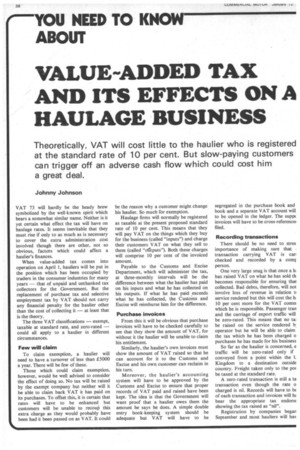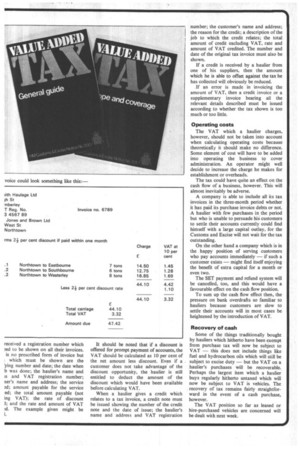VALUE ADDED TAX AND ITS EFFECTS ON A HAULAGE BUSINESS
Page 40

Page 41

If you've noticed an error in this article please click here to report it so we can fix it.
Theoretically, VAT will cost little to the haulier who is registered at the standard rate of 10 per cent. But slow-paying customers can trigger off an adverse cash flow which could cost him a great deal.
Johnny Johnson VAT 73 will hardly be the heady brew symbolized by the well-known spirit which bears a somewhat similar name. Neither is it yet certain what effect the tax will have on haulage rates. It seems inevitable that they must rise if only to as much as is necessary to cover the extra administration cost involved though there are other, not so obvious, factors which could affect a haulier's finances.
When value-added tax comes into operation on April 1, hauliers will be put in the position which has been occupied by traders in the consumer industries for many years — that of unpaid and unthanked tax collectors for the Government. But the replacement of purchase tax and selective employment tax by VAT should not carry any financial penalty for the haulier other than the cost of collecting it — at least that is the theory.
The three VAT classifications — exempt, taxable at standard rate, and zero-rated — could all apply to a haulier in different circumstances.
Few will claim To claim exemption, a haulier will need to have a turnover of less than £3000 a year. There will be few of these.
Those which could claim exemption, however, would be well advised to consider the effect of doing so. No tax will be raised by the exempt company but neither will it be able to claim back VAT it has paid on its purchases. To offset this, it is certain that rates will have to be enhanced but customers will be unable to recoup this extra charge as they would probably have been had it been passed on as VAT. It could be the reason why a customer might change his haulier. So much for exemption.
Haulage firms will normally be registered as taxable at the present proposed standard rate of 10 per cent. This means that they will pay VAT on the things which they buy for the business (called "inputs") and charge their customers VAT on what they sell to them (called "oltputs"). Both these charges will comprise 10 per cent of the invoiced amount.
Payable to the Customs and Excise Department, which will administer the tax, at three-monthly intervals will be the difference between what the haulier has paid on his inputs and what he has collected on his outputs. If what he has paid .exceeds what he has collected, the Customs and Excise will reimburse him for the difference.
Purchase invoices From this it will be obvious that purchase invoices will have to be checked carefully to see that they show the amount of VAT, for without it the haulier will be unable to claim his entitlement.
Similarly, the haulier's own invoices must show the amount of VAT raised so that he can account for it to the Customs and Excise and his own. customer can reclaim in his turn.
Moreover, the haulier's accounting system will have to be approved by the Customs and Excise to ensure that proper records of VAT paid and raised have been kept. The idea is that the Government will want proof that a haulier owes them the amount he says he does. A simple double entry book-keeping system should be adequate but VAT will have to be segregated in the purchase book and book and a separate VAT account will to be opened in the ledger. The suppc invoices will have to be cross-reference4 filed.
Recording transactions There should be no need to stres importance of making sure that transaction carrying VAT is can checked and recorded by a corny person.
One very large snag is that once a It has raised VAT on what he has sold th becomes responsible for ensuring that collected. Bad debts, therefore, will not involve loss of revenue in relation ti service rendered but this will cost the h 10 per cent more for the VAT cornet which he is responsible. Passenger tran and the carriage of export traffic will be zero-rated. This means that no ta: be raised on the service rendered b. operator but he will be able to claim the tax which he has been charged o purchases he has made for his business
So far as the haulier is concerned, e traffic will be zero-rated only if conveyed from a point within the L Kingdom to a destination outside country. Freight taken only to the pot be taxed at the standard rate.
A zero-rated transaction is still a ta transaction even though the rate o charged is nil. Records will have to be of each transaction and invoices will tu bear the appropriate tax endorst showing the tax raised as "nil".
Registration by companies began September and most hauliers will has
received a registration number which ;ed to be shown on all their invoices. is no prescribed form of invoice but
which must be shown are the ying number and date; the date when b was done; the haulier's name and ;s and VAT registration number; aer's name and address; the service ;c1; amount payable for the service ed; the total amount payable (not ing VAT); the rate of discount i; and the rate and amount of VAT xi The example given might be !. It should be noted that if a discount is offered for prompt payment of accounts, the VAT should be calculated as 10 per cent of the net amount less discount. Even if a . customer does not take advantage of the discount opportunity, the haulier is still entitled to deduct the amount of the discount which would have been available before calculating VAT.
When a haulier gives a credit which relates to a tax invoice, a credit note must be issued showing the number of the credit note and the date of issue; the haulier's name and address and VAT registration number; the customer's name and address; the reason for the credit; a description of the job to which the credit relates; the total amount of credit excluding VAT, rate and amount of VAT credited. The number and date of the original tax invoice must also be shown.
If a credit is received by a haulier from one of his suppliers, then the amount which he is able to offset against the tax he has collected will obviously be reduced.
If an error is made in invoicing the amount of VAT, then a credit invoice or a supplementary invoice bearing all the relevant details described must be issued according to whether the tax shown is too much or too little.
Operating costs The VAT which a haulier charges, however, should not be taken into account when calculating operating costs because theoretically it should make no difference. Some element of cost will have to be added into operating the business to cover administration. An operator might well decide to increase the charge he makes for establishment or overheads.
The tax could have quite an effect on the cash flow of a business, however. This will almost inevitably be adverse.
A company is able to include all its tax invoices in the three-month period whether it has paid its purchase invoice debts or not. A haulier with few purchases in the period but who is unable to persuade his customers to settle their accounts currently could find himself with a large capital outlay, for the Customs and Excise will not wait for the tax outstanding.
On the other hand a company which is in the happy position of serving customers who pay accounts immediately — if such a customer exists — might find itself enjoying the benefit of extra capital for a month or even two.
The SET payment and refund system will be cancelled, too, and this would have a favourable effect on the cash flow position.
To sum up the cash flow effect then, the pressure on bank overdrafts so familiar to hauliers because customers are slow to settle their accounts will in most cases be heightened by the introduction of VAT.
Recovery of cash Some of the things traditionally bought by hauliers which hitherto have been exempt from purchase tax will now be subject to VAT — this does not include things like fuel and hydrocarbon oils which will still be subject to excise duty — but the VAT on a haulier's purchases will be recoverable. Perhaps the largest item which a haulier buys regularly hitherto untaxed which will now be subject to VAT is vehicles. The recovery of tax remains fairly straightforward in the event of a cash purchase, however.
The VAT position so far as leased or hire-purchased vehicles are concerned will be dealt with next week.








































































































